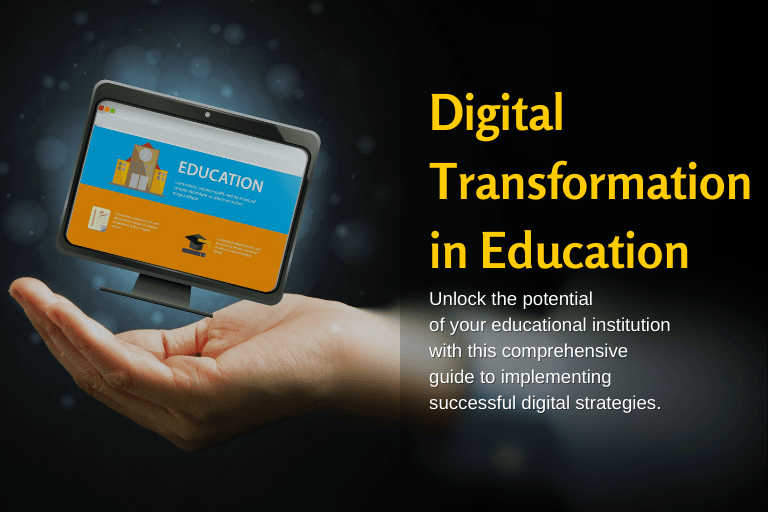
Leverage Digital Transformation to make your life ‘A Living Heaven’👍
Digital Transformation in the Education Sector
What is Digital Transformation in Education?
Digital transformation in education refers to the integration of digital technologies into all aspects of the educational process. This transformation involves the use of tools such as online learning platforms, digital classrooms, AI-driven analytics, and virtual reality to enhance teaching and learning experiences. In higher education, digital transformation includes advancements like e-learning systems, digital libraries, and sophisticated administrative software that streamline operations.
Introduction
Digital transformation is a pivotal force reshaping industries worldwide, and the education sector is no exception. From digital transformation executive education to primary schooling, digital technologies are transforming how education is delivered, managed, and experienced. This blog delves into the multifaceted impacts of digital transformation in education, highlighting its significance, benefits, challenges, and future trends.
Key Elements of Digital Transformation in Education!
- Digital Classrooms: Traditional classrooms are being replaced by digital environments where interactive and multimedia tools facilitate a more engaging learning experience.
- Online Learning Platforms: These platforms offer flexible, accessible, and personalised learning opportunities for students.
- AI and Analytics: Artificial intelligence helps in customising learning experiences, predicting student outcomes, and improving administrative efficiency.
- Virtual and Augmented Reality: These technologies provide immersive learning experiences, particularly in fields like medicine and engineering.
- Cloud Computing: Essential for storing vast amounts of educational data and providing access to resources anytime, anywhere.
Importance of Digital Transformation in Education
The importance of digital transformation in education cannot be overstated. It enhances the quality of education, makes learning more accessible, and prepares students for the digital future. For instance, the importance of digital transformation in higher education lies in its ability to offer students more flexible learning options and equip them with the digital skills necessary for the modern workforce.
Examples and Case Studies…
– Tertiary education digital transformation: Universities are adopting digital tools to enhance research capabilities and streamline administrative tasks.
– Pathology education powered by virtual and digital transformation: Medical education has benefited immensely from digital tools that provide realistic simulations for practice.
Benefits of Digital Transformation in Education
- Enhanced Learning Experiences: Digital tools make learning more interactive and engaging.
- Accessibility and Flexibility: Students can learn at their own pace and from any location.
- Improved Administrative Efficiency: Automation of administrative tasks reduces workload and errors.
- Data-Driven Decision Making: Analytics provide insights into student performance and institutional efficiency.
How Digital Transformation Affects Teachers and Educational Institutions?
Teachers benefit from digital transformation through access to advanced teaching tools and resources, enabling them to deliver more effective and personalised instruction. Educational institutions can optimise their operations, improve resource management, and better support students.
Challenges of Digital Transformation in Education
- Digital Divide: Not all students have equal access to digital devices and the internet.
- Training and Adaptation: Teachers and staff need adequate training to effectively use new technologies.
- Privacy and Security: Protecting student data and maintaining privacy are critical concerns.
- Initial Costs: Implementing digital transformation can be costly, particularly for underfunded institutions.
Overcoming Challenges
Efforts to bridge the digital divide include government and private sector initiatives to provide devices and internet access to underserved communities. Continuous professional development and training programs help educators adapt to new technologies. Robust cybersecurity measures ensure the protection of data.
Digital Transformation in Higher Education
Digital transformation is particularly significant in higher education, where it supports advanced research, enhances administrative efficiency, and prepares students for the digital economy. Institutions like those in Hungary are actively supporting the digital transformation of higher education through comprehensive frameworks and policies.
Future Trends
- Education 4.0: Emphasises the integration of digital technologies to create a more personalised and student-centred learning environment.
- AI and Machine Learning: These technologies will further enhance personalised learning and predictive analytics.
- Global Collaboration: Digital platforms facilitate international collaboration and exchange of knowledge.
Trends in the Education Industry
The education industry is witnessing several trends driven by digital transformation:
- Digital education industry: Growth in the development and adoption of educational technologies and digital tools.
- Education sector trends: Increasing emphasis on personalised learning, competency-based education, and lifelong learning.
- Digital learning transformation: Shift towards online and hybrid learning models, making education more flexible and accessible.
Conclusion
The digital transformation of education is an ongoing journey that holds immense potential to revolutionize how we teach and learn. While there are challenges to overcome, the benefits far outweigh the drawbacks. Embracing digital transformation will ensure that education systems are equipped to meet the demands of the future, providing students with the skills and knowledge they need to thrive in a digital world.

